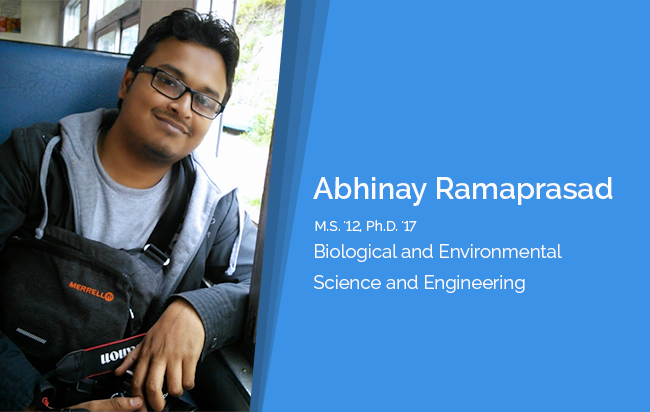Alumnus receives Marie Skłodowska-Curie Fellowship

Alumnus Abhinay Ramaprasad (M.S. '12, Ph.D. '17) was awarded the prestigious Marie Skłodowska-Curie Fellowship from the European Commission, and he has started his new position researching malaria at the U.K.'s Francis Crick Institute. Image courtesy of Abhinay Ramaprasad.
- By Andrea Hulsbosch, KAUST News
KAUST alumnus Abhinay Ramaprasad recently started his position as a Marie Skłodowska-Curie Fellow at the Francis Crick Institute in London. This new step in his career is a great personal achievement for the former Ph.D. student from KAUST.
"Since these fellowships are highly competitive, I was incredibly happy that I managed to pull through," said Ramaprasad.
Ramaprasad obtained both his master's degree (bioscience, '12) and his Ph.D. from KAUST in the University's Biological and Environmental Science and Engineering division. He received his Ph.D., which focused on pathogen genomics, in 2017, and was then awarded the internationally prestigious Marie Skłodowska-Curie Fellowship from the European Commission.
The Marie Skłodowska-Curie Fellowship supporting malaria research
Ramaprasad specializes in phenotype-genotype correlations and comparative genomics in malaria parasites. When a human suffers from malaria, parasites invade the red blood cells and grow and multiply within them, and eventually the daughter parasites exit to infect other red blood cells. Ramaprasad is trying to understand the underlying mechanisms of how malaria parasites exit the red blood cell, a process known as malaria parasite egress.
The Marie Skłodowska-Curie Fellowship gives him the opportunity to work in the Malaria Biochemistry Laboratory of the Francis Crick Institute. This lab's area of research varies significantly from his Ph.D. research and is therefore an ideal platform from which to learn and apply methods from different disciplines to answer his research question.
"Malaria kills around half a million people annually and exerts a heavy toll on public health, especially in malaria-endemic regions like sub-Saharan Africa. Understanding how malarial parasites exit the host cell will help in identifying potential drug targets that can block egress and stop further disease progression," explained Ramaprasad.

Malaria affects millions of people around the world each year and is a life-threatening disease caused by Plasmodium parasites transmitted through the bites of female Anopheles mosquitoes. File photo.
A wonderful multicultural ecosystem
Ramaprasad feels that his time at KAUST prepared him for a fruitful career in science.
"KAUST offers highly talented faculty members to guide new students, incredible lab facilities to do research and a wonderful multicultural ecosystem to thrive in. I acquired a significant amount of knowledge and training in the field of malaria genomics in Professor Arnab Pain's laboratory. This, and the research publications that came with it, played a very important role in my application for the Marie Skłodowska-Curie Fellowship," Ramaprasad noted.
"I would advise current students to—apart from their coursework—take part in a research group to acquire invaluable skills and knowledge, as I did," he continued. "For the students already in research, I would insist upon the importance of having a clear, well-thought-out research plan at the very beginning to be effective and to get the most out of your research at KAUST."
Related stories:
- Exploring the metaorganism future
- SABIC postdoctoral fellowships emphasize collaboration
- Alumni Focus: Hessa Al-Quwaiee - M.S. '13, Ph.D. '16 in electrical engineering
-
Fourth Nature appearance for former KAUST student

